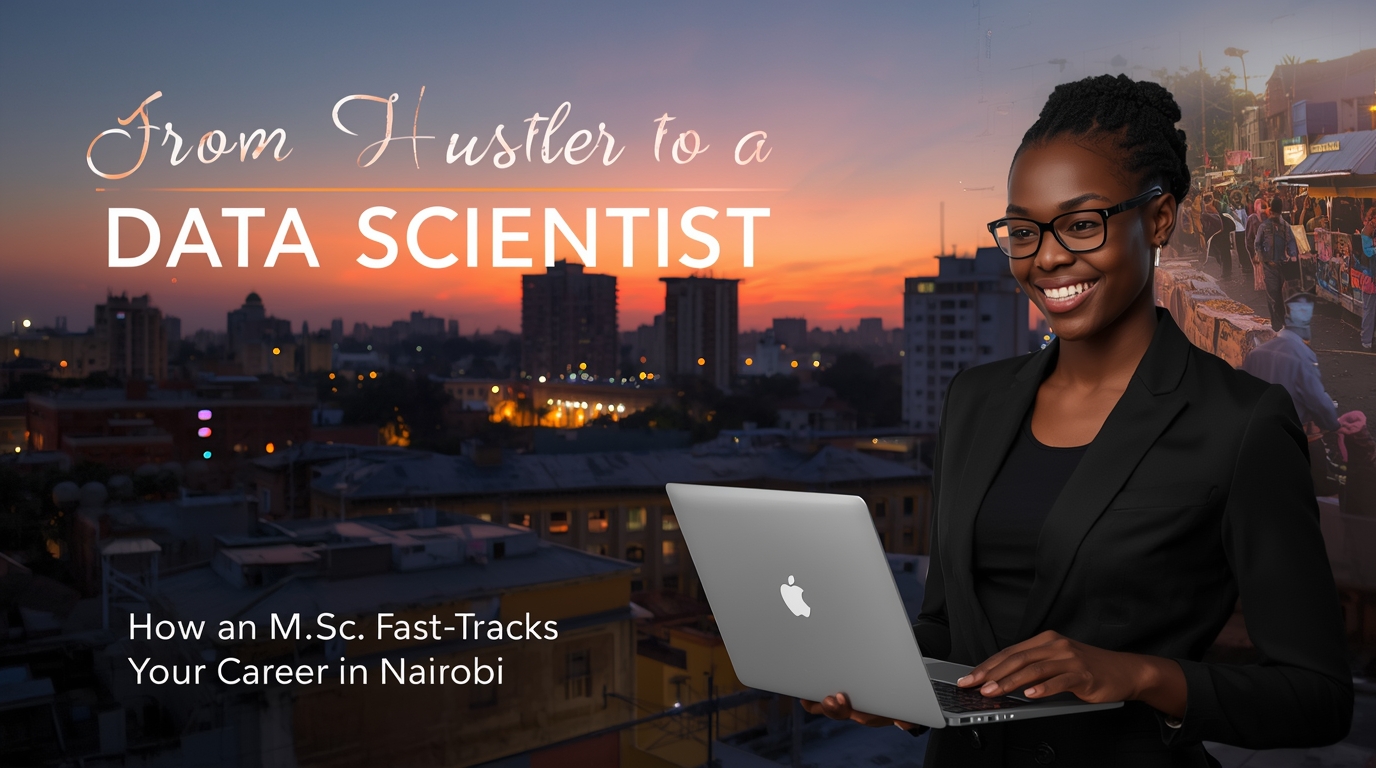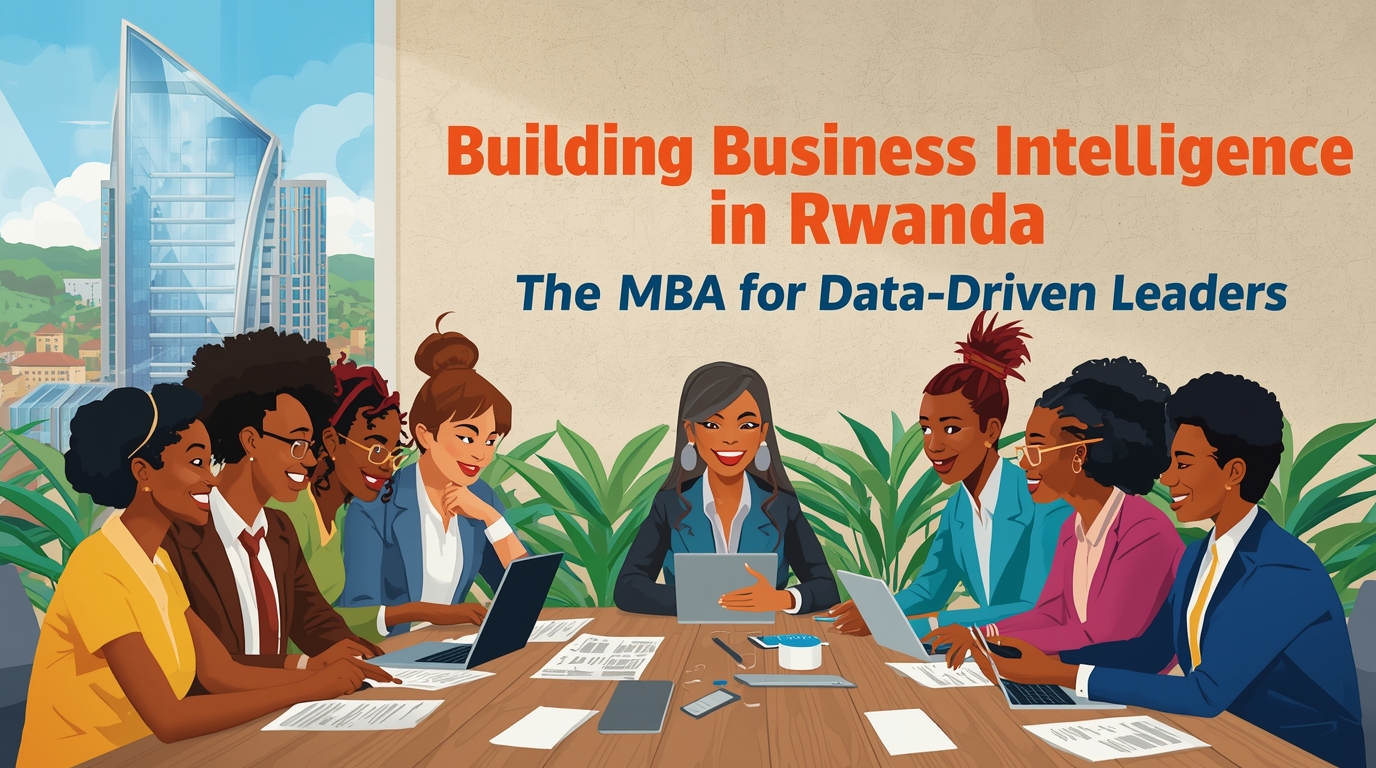I remember my first proper pitch meeting. I was at one of those shiny co-working spaces in Westlands, coffee in hand, heart pounding. I had an idea—a really good one, I knew it in my gut. It was a logistics solution for small businesses, and I knew it would work. I’d seen the gap in the market with my own eyes.
I gave the pitch of my life. All passion, all hustle.
Then the team after me walked in. They had one slide that just… flattened me. It was a map of Nairobi, showing the precise delivery “dead zones” and the exact percentage of lost revenue from failed deliveries in those areas. They had data. I just had my hustle.
Guess who got the second meeting?
It was a tough lesson, but it was a crucial one. Here in Nairobi, our hustle is our superpower. It’s in our DNA. We are a city of innovators, of side-hustlers, of people who make things happen from nothing. But the game is changing.
The ‘Silicon Savannah’ isn’t just about good ideas anymore. It’s about proven ideas. And the proof, the new language of business, is data.
The Hustler’s Ceiling: When Gut-Feel Isn’t Enough
We all know someone who built a business on pure instinct. They could just feel what the customer wanted, which matatu route was profitable, or what product would fly off the shelves. For a long time, that’s all you needed.
But now? We’re drowning in information. From M-Pesa transactions and social media trends to website clicks and delivery logs. The most successful companies in Kenya right now—the FinTechs, the logistics apps, the e-commerce giants—aren’t just lucky. They are listening to the data.
This is where so many ambitious young professionals get stuck. You’ve got the hustle, you’ve got the ambition, but you feel like you’re hitting a wall. You’re in meetings where people are talking about ‘customer acquisition cost’ and ‘churn rate’, and you’re just… nodding along, relying on your gut.
Your gut is a brilliant compass. It tells you which direction to go. But data is the satellite navigation. It gives you the step-by-step instructions, shows you the traffic jams, and finds the fastest route to your destination.
To win in Nairobi’s new economy, you need both.
So, What on Earth is a “Data Scientist” Anyway?
Let’s be honest, the title “Data Scientist” sounds intimidating. It sounds like someone in a white lab coat who only speaks in code.
Forget that. Let’s use a better word: Data Detective.
A Data Scientist is the person who walks into a messy room full of numbers and spreadsheets—where everyone else just sees chaos—and they can find the one clue that cracks the whole case.
They’re the ones who can answer the real questions:
- Why are our customers in Buruburu dropping off the app after just one week?
- Which specific products should we advertise to our customers in Kilimani?
- Where should we open our next delivery hub to have the biggest impact?
They are, quite simply, the most powerful people in the building. They don’t just have opinions; they have evidence. And they can turn that evidence into a story that a CEO can understand. A hustler senses an opportunity. A data scientist proves where it is, how big it is, and exactly how to go and get it.
Let’s Talk About the ‘Buts’
I can hear what you’re thinking, because I’ve been there. The moment you consider getting a proper qualification, a wall of ‘buts’ springs up.
- “But I’m not a maths genius.” This is the biggest one. You think it’s all about complex equations. Here’s the secret: it’s less about being a maths whizz and more about being a logical, curious problem-solver. It’s about the mindset of a detective, not just a mathematician.
- “But I don’t have the time.” You’re already working, you’re already hustling. How can you possibly fit in a Master’s degree? A modern M.Sc. isn’t like the university you remember. It’s built for people like you. It’s flexible. It’s online. It’s designed to fit around your hustle, not stop it.
- “But the cost…” This is a real one. A Master’s is an investment. But let’s re-think ‘cost’. What is the cost of staying where you are? The cost of being stuck in a mid-level job for another five years? The cost of having your ideas ignored because you can’t back them up? When you think about the salary of a Data Scientist (which is one of the highest in the tech industry), the M.Sc. stops being a ‘cost’ and starts looking like the smartest investment you’ll ever make.
The M.Sc: The Fast-Track from Hustle to High-Flyer
Here’s the truth. You could learn all this stuff on your own, piecing it together from YouTube videos and blog posts. That’s the long, slow, grinding path.
An M.Sc. in Data Analytics is the fast-track. It’s the structured, intensive bootcamp that gives you the complete, end-to-end toolkit, fast. It’s designed to take someone with ambition (that’s you) and, in a short, focused time, turn them into a professional that companies are desperate to hire.
What does this “toolkit” actually include?
- The Art of Asking the Right Questions: You’ll learn how to approach a business problem like a detective. How to form a hypothesis. How to know what to look for before you even open a spreadsheet.
- The ‘Magnifying Glass’ (Finding the Clues): You’ll get your hands dirty with the real tools. You’ll learn to “speak” data—using languages like SQL to pull exactly the right information from massive databases. You’ll learn how to clean up messy, real-world data and get it ready for investigation.
- The ‘Interrogation Room’ (Making the Data Talk): This is the exciting bit. You’ll learn the power of Python or R to spot patterns no human could ever see. This is where you find the ‘secret’—the customer trend, the market gap, the big opportunity.
- The ‘Big Reveal’ (Telling the Story): This is the skill that gets you paid. A Data Scientist isn’t just a numbers person; they are a storyteller. You’ll learn how to use Data Visualisation tools (like Tableau or Power BI) to turn your boring numbers into a powerful, persuasive chart or dashboard that a CEO can understand in 30 seconds.
You stop being the person with a “gut-feeling” and become the person who says, “Here is the evidence, here is the story it tells, and here is the multi-million shilling opportunity we are missing.”
Why Nairobi? Why Right Now?
Look around you. Nairobi is not just a tech hub; it’s a data hub.
- FinTech: Our city is the world-leader. Companies from Tala and Branch to KCB and Safaricom are built on one thing: analysing user data to make smart decisions.
- E-Commerce: Jumia, Glovo, and hundreds of other online stores live and die by their ability to understand what you’ll buy next.
- Logistics & AgriTech: Companies are using data to build smarter supply chains, track produce, and get goods to people faster.
These companies are STARVING for people who can do this. They are posting jobs every single day for ‘Data Analysts’, ‘Business Intelligence Analysts’, and ‘Data Scientists’. And they are paying top-tier salaries for them.
This M.Sc. is not a generic, theoretical degree. It is a direct key to the best jobs in the best companies in our city, right now.
Your Hustle Got You Here. Data Will Get You There.
Your hustle is what makes you Kenyan. It’s your ambition. It’s your drive. It’s the reason you’ve already gotten this far. Don’t ever let go of it.
But the hustle, on its own, has a ceiling.
To break through that ceiling, you need to supercharge your hustle with a new superpower. That power is data.
You don’t have to make a big decision today. But your ambition brought you to this article for a reason. So, just be curious. Take the next small step.
Don’t sign up for anything. Just have a look. See what a programme like the M.Sc. in Data Analytics actually involves. Look at the modules. Read about the skills. Imagine yourself, one year from now, walking into that same pitch meeting, not just with passion, but with the undeniable, irrefutable proof.
Your hustle got you to the door. Data is the key that unlocks it.
Frequently Asked Questions
I’m a “hustler” with great ideas, but let’s be honest, I’m not a maths genius. Can I realistically succeed in this programme?
This is the number one question we hear, and it’s a valid one. The secret is that data science today is less about being a pure mathematician and more about being a curious problem-solver. The blog calls it the “Data Detective” mindset. You don’t need to be a wizard at calculus, but you do need to be logical and enjoy finding the ‘why’ behind the numbers. The programme is designed to teach you the practical, applied maths and statistics you actually need for the job, within the context of the tools you’ll be using.
I’m already working a full-time job in Nairobi, plus a side-hustle. How can I possibly find the time for a full Master’s degree?
This programme is built for you. It is not a traditional 9-to-5 university schedule. It’s a flexible, online M.Sc. designed to fit around your hustle, not replace it. You can study on evenings, weekends, or whenever you can carve out the time. The whole point is to give ambitious people who are already working a way to “fast-track” their skills without having to put their entire life on pause.
Why should I pay for a full M.Sc. when I can just learn tools like Python and SQL on my own from YouTube?
You absolutely can learn coding from YouTube, but that’s the long, slow, and unstructured path. The blog describes this M.Sc. as a “fast-track” and a “bootcamp” for a reason. It gives you three things you can’t get from random tutorials:
The “Why”: It doesn’t just teach you how to code; it teaches you what business problems to solve. That’s the difference between a coder and a data scientist.
A Complete Toolkit: It connects all the dots, from finding the data (SQL) to analysing it (Python) to, most importantly, telling the story (Visualisation).
Structure & Credibility: It provides a formal, structured path that proves to employers you have a complete, professional-level education, not just a few pieced-together skills.
You talk a lot about “storytelling,” but what are the actual technical skills I’ll have when I graduate?
Great question. You will graduate with a specific, in-demand technical toolkit. The blog’s “Data Detective” analogy breaks it down:
The “Evidence Board”: You’ll learn Data Visualisation software (like Tableau or Power BI) to turn your boring spreadsheets into powerful, persuasive charts and dashboards that a CEO can understand in 30 seconds.
The “Magnifying Glass”: You’ll learn SQL (Structured Query Language) to find and pull the exact clues you need from massive databases.
The “Interrogation Room”: You’ll master tools like Python or R to “make the data talk”—finding patterns, running statistical models, and discovering insights.
How does this degree actually help me get a job in the Kenyan market?
This M.Sc. is like a direct key to the fastest-growing companies in Nairobi. The blog mentions that FinTech (like M-Pesa, Tala, KCB), E-Commerce (like Jumia), and Logistics/AgriTech are all built on data. These companies are “starving” for people who can do more than just manage—they need people who can analyse. You won’t just be qualified for generic “manager” jobs; you’ll be qualified for high-demand, high-salary roles like Data Analyst, Business Intelligence Analyst, and Data Scientist.




